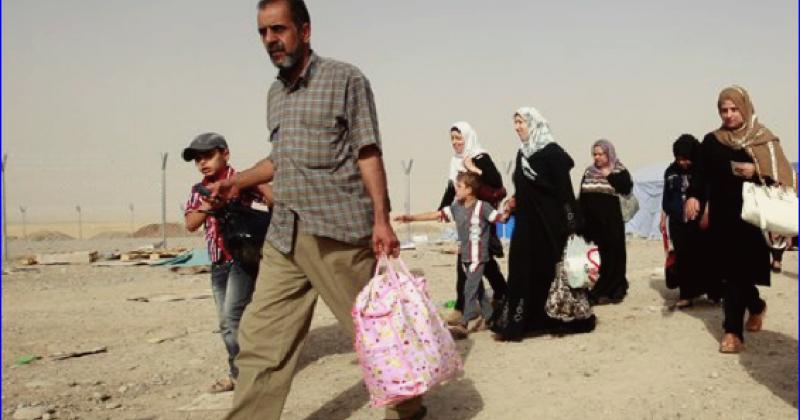The brothers arrived from Erbil on July 21 after being driven from Mosul along with thousands of other Christian families that the "Islamic State in Iraq and Syria" (ISIS) had forced to choose between exile, conversion to Islam or death by sword.
They are now living in an apartment in Sad al-Bouchrieh provided by Father George Youkhana, rector of St. George Assyrian Church of the East, as they try to pick up the pieces of their lives.
"My wife, my 1-year-old child and I were displaced from Mosul, as was my brother and thousands of other Christians, by a criminal organisation and its fighters," Samir, 27, told Al-Shorfa.
"Afghans, Saudis and Iraqis attacked us and forced us to leave," he said, explaining that on July 17th, ISIS set a two-day deadline for Christians to leave Mosul.
"They raised their black flags everywhere, especially atop our churches, and marked the doors of our homes with the [Arabic] letter 'nuun', for 'Nazarene'," he said.
ISIS fighters spread throughout the neighbourhoods of Mosul, Samir said, and "after they blocked all the exits out of the city except one, we left in one convoy towards safer areas".
On the way out, ISISfighters seized the car his family was travelling in, searched the family one by one and took the money they had, he said.
They told the family, "This is the Islamic State in Mosul, and you are not welcome in our state. Do not come back," Samir said.
After a long journey to Qara Qosh, and from there to Erbil, the two brothers arrived in Beirut.
While Samir sobs silently over their circumstances and unknown fate, his brother Fadi, 23, voices his anger at ISIL's "disturbing and despicable" practices, which he says have nothing to do with Islam.
"We left our homes and property," Fadi told Al-Shorfa. "They took everything from us, including the [fruit of] my father's many years of labour. My wife and I and my brother's family are living in fear, despite having arrived in Lebanon, because we do not know our fate."
Qara Qosh native Khalil Atallah found a small room in which to shelter his family -- his wife, Haifa, daughters Lara, 7, Diana, 5, and Larita, 4, and son Behnam, 2 – in the Jdeideh neighbourhood of al-Zaitriyeh.
In this room, which is no more than 30 square metres and serves as a bedroom, sitting room and kitchen, Atallah finds release from their fear.
"After ISIS besieged Qara Qosh and bombarded it with artillery, targeting women and children, I feared for my family, especially my daughter Lara who is afflicted with the systemic lupus erythematosus (SLE/Lupus) disease and needs treatment," he told Al-Shorfa. "We had previously lost a daughter to the same disease."
Atallah said he left for Erbil and travelled from there to Lebanon to seek treatment for her and to escape ISIS. "
We did not expect what is happening," he said. "All of us as Christians have a real imminent fear of ISIS."
ISIS seizes Christian homes
Father Youhanna Dinha, a Chaldean Catholic monk, told Al-Shorfa he was in Mosul when ISIS launched its attack on the city.
"We closed the doors of our churches and monasteries when the attack began," he said. "We were startled on Friday, July 18th, by what was said in the Friday speeches in the mosques and being given a 10-hour deadline to vacate the city."
Before issuing its deadline, ISIL elements spray painted the letter 'nuun' in red on the doors of the houses of Christians, along with the message 'ISIL State Municipality' in black in an attempt to assert ownership of the property, he said.
Between that Friday and Saturday morning, more than 1,050 families left Mosul, said Dinha, who is now in Beirut, and the only ones left are the elderly and the sick, whose fate is unknown.
"ISIS distorts the true image of Islam, for Islam is not like that," he said.
"Our people of all Christian denominations live in fear of a real genocide," Dinha said. "More than 40,000 have been displaced from Mosul and more than 50 monasteries, churches and numerous Christian shrines and [relics] are in the hands of ISIS, which burned churches, destroyed their icons and crosses and raised its black flags atop them."
Last week, the heads of Eastern Christian denominations sounded the alarm over the abuse and displacement that members of their parishes in northern Iraq have suffered at the hands of ISIS.
During a meeting in Beirut, they issued an appeal to the world to help Iraq's Christians and curb the rise and influence of ISIS, which poses a threat to humanity.
